The video posted online shows Republican Rep. Tim Walberg seemingly suggesting that bombs should be dropped on Gaza “like Nagasaki and Hiroshima” to quickly end the conflict. His comments were made during a virtual event hosted by a Democratic advocacy group. Walberg claims that he was speaking metaphorically and did not mean his words to be taken literally.
The reference to the atomic strikes on Japan during WWII has sparked controversy and backlash against Walberg. Many have condemned his remarks as insensitive and inappropriate, especially given the ongoing conflict in Gaza that has resulted in numerous civilian casualties. Walberg’s comments have fueled further tensions and heightened the debate surrounding US foreign policy in the Middle East.
In response to the criticism, Walberg maintains that he was not advocating for actual bombing of Gaza and that his words were meant to express the need for a swift resolution to the conflict. He has stated that he regrets any offense caused by his remarks and that he is committed to finding peaceful and diplomatic solutions to the situation in Gaza. However, his comments have raised concerns about the level of discourse and rhetoric used by politicians in discussing sensitive international issues.
The controversy surrounding Walberg’s comments highlights the deep divisions and complexities surrounding the Israeli-Palestinian conflict. The conflict in Gaza has long been a contentious issue with strong opinions on both sides. Walberg’s remarks have reignited debates about US involvement in the region and the approach taken by lawmakers in addressing the conflict. The incident serves as a reminder of the importance of thoughtful and respectful dialogue in discussing such volatile and emotionally charged topics.
As the backlash against Walberg continues to grow, it underscores the need for elected officials to choose their words carefully and consider the impact of their statements on global relations. The incident has also prompted discussions about the role of political leaders in shaping public opinion and the responsibility they have in promoting diplomacy and peace. Moving forward, it will be important for all parties involved to engage in constructive dialogue and seek peaceful solutions to the ongoing conflict in Gaza, rather than resorting to inflammatory rhetoric or violence.
In conclusion, Rep. Tim Walberg’s comments regarding bombing Gaza “like Nagasaki and Hiroshima” have stirred controversy and outrage. While he claims he was speaking metaphorically, his remarks have been widely criticized as insensitive and inappropriate. The incident highlights the complexities of the Israeli-Palestinian conflict and the challenges of discussing such sensitive issues. It also underscores the importance of promoting peaceful dialogue and avoiding inflammatory rhetoric in addressing global conflicts. Ultimately, the incident serves as a reminder of the responsibility that political leaders have in promoting diplomacy and working towards peaceful resolutions to conflicts around the world.


